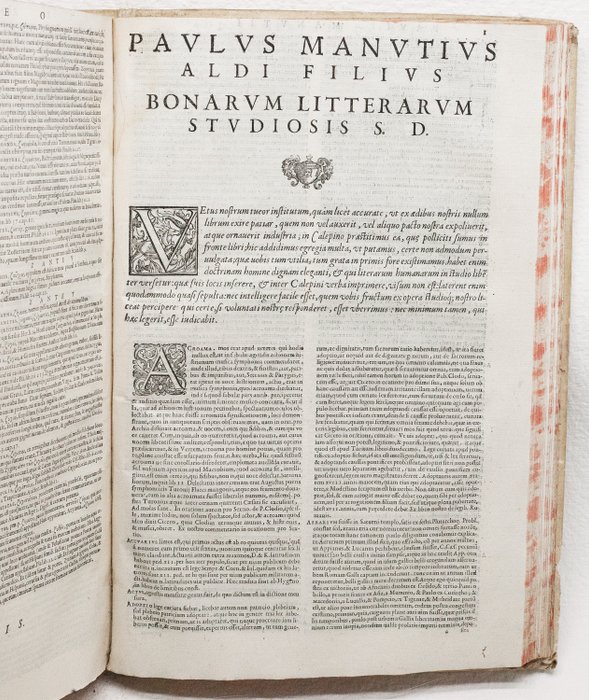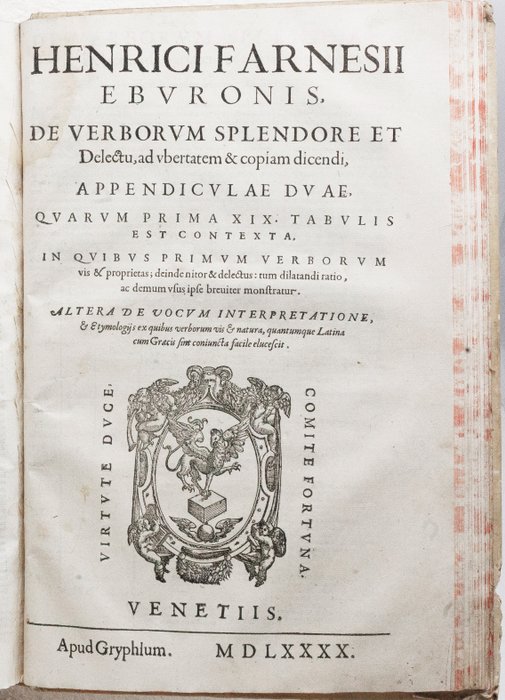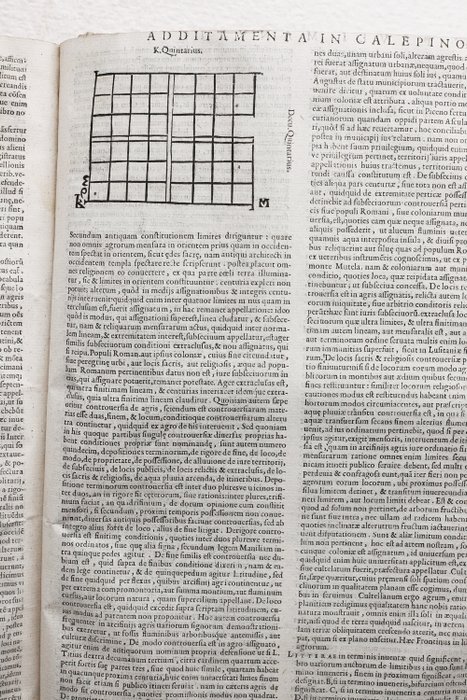Advert Description
Are you interested in this item? This item is up for auction at Catawiki. Please click on "respond to advert" (orange button) to get redirected to the Catawiki website. Catawiki’s goal is to make special objects universally available. Our weekly auctions feature thousands of unusual, rare, and exceptional objects you won’t find in just any store. SIXTEENTH-CENTURY EDITION OF THE CALEPINO, WITH THE COMMENTARY OF PAOLO MANUZIO - IN FOLIO
Large sixteenth-century folio volume. Contains the glosses of Paolo Manuzio who comments on various items. It follows with its own title page, "Henrici farnesii Eburonis, De Verborum splendor and the third title page of the "Vocabolario Vulgare e Latino" by Luc'antonio Bevilacqua printed in Venice in 1589.
Title page with the famous imprint of the Gripho: a Griffin holding a stone above a winged globe.
CONTENTS
Three works bound together. Sixteenth-century version of the famous "Calepino", by Ambrogio da Calepio who in 1502 published the first Latin dictionary. Sixteenth-century version of the famous "Calepino", by Ambrogio da Calepio who in 1502 published the first Latin dictionary.
The first edition of the Dictionarium latinum was published in 1502 by the Emilian typographer Dionigi Bertocchi, but was considered incomplete due to inopportune omissions and additions made by the typographer himself. Calepio immediately set to work to improve and complete his work, quickly producing a second edition.
Ambrogio Calepio (Castelli Calepio, 1435 - Bergamo, 1511) was an Italian humanist and Latinist, known for the Dictionarium latinum, a monumental lexicographic and encyclopedic work on the Latin language.
In the first edition, the dictionary was monolingual in Latin and contained many citations. The second edition, published in 1509, was instead in four languages: Hebrew, Greek, Latin and Italian. Calepio continued his lexicographic work but, also due to his blindness, he was unable to see the final result of his efforts.
In 1520, Bernardino Benaglio from Bergamo printed the twenty-fourth edition of the dictionary, considered the definitive one. The work became famous throughout Europe as «Calepino», in honor of its author, and its wide notoriety was also due to the fact that it subsequently assumed a polyglot character, with versions in numerous modern languages. No less than two hundred and eleven re-editions were printed from 1502 to 1779, prints which led the work to undergo numerous changes.
In the Italian language the word "calepino" is, par excellence, "vocabulary".
CONDITION REPORT : COMPLETE
In folio. Eighteenth-century full parchment binding with signs of wear, calligraphed title on the spine, solid binding, well-bound block of pages, fresh and crisp paper. Text in two columns. Title page printed in red and black. Engraved cartouches and drop caps. Sprayed cuts. Typographic brand with the classic griffin appearing on the three title pages. Ownership notations and ink sketches on first title page. Lack mentioned on the last page of the volume, which damages about half of it. Noble ex libris on the frontispiece. Leaves 412, 396, 34, 40, 84 numbered only on recto.
FULL TITLES & AUTHORS
Ambrosii Calepini - Dictionarium In quuo restituendo, atque exornando haec praestititmus. Additamenta Pauli Manutii, tum ad intelligendam, tum ad exornandam linguam Latinam, quaedam etiam Romanarum rerum scientiam utilissima. Adiecta sunt synonyma, vocum differentiae, antitheta, lectiora adagia, voces Ciceronianae, etc.
Venetiis, Apud Ioannem Gryphium, 1560.
Ambrogio da Calepio, 1435-1510
"Paulus Manutius Aldi filius Bonarum Litterarum Scholars S.D." follows. Finally, with an independent title page, "Henrici farnesii Eburonis, De Verborum splendor et delectu, ad uberattem & copiem dicendi. Appendiculae duae, quarum prima XIX tabulis est contexta, in quibus primun verborum vis & proprietas; deinde nitor & delectus: tum dilatandi ratio , ac demum usus ipse breviter monstratur" (Venetiis, Apud Gryphium, 1590, pg.40 numbered only on recto) and "Vulgar and Latin vocabulary, not only of all Italian voices; but also of Modern, & Ancient names of the Provinces , Cities, Mountains, & Rivers from all parts of the World, taken from Pliny, Ptolemy, Strabo, & other good Writers. With infinite elegances, chosen by Cicero, placed in the meaning of the Word, from which they are born. There are also the names of simple things, fish, & other notable things, & worth knowing, composed for Luc'Antonio Bevilacqua" (In Venetia, 1589, 84 pages numbered only on the recto). 67327459





